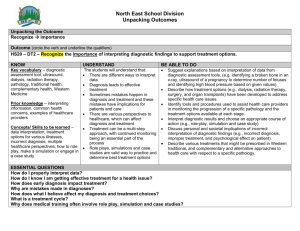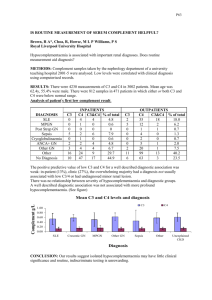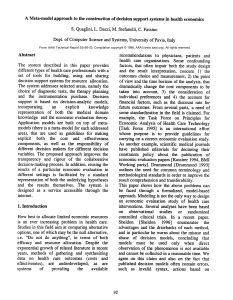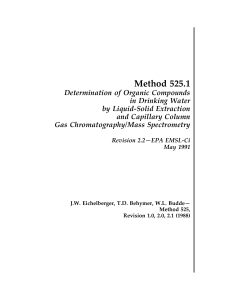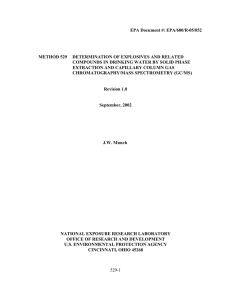Diagnostic Blood Testing
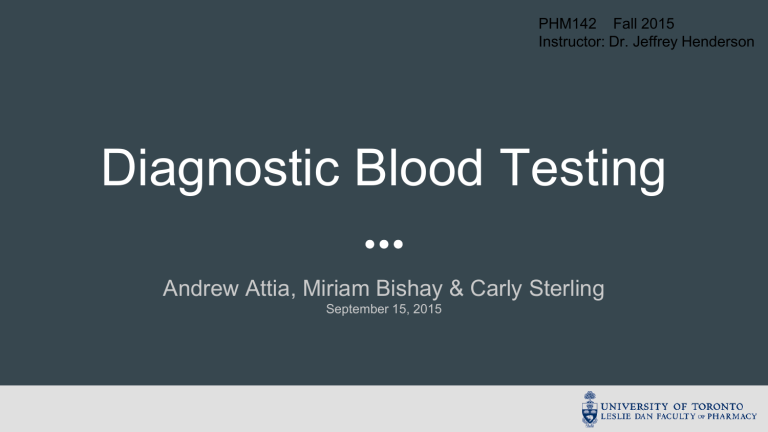
PHM142 Fall 2015
Instructor: Dr. Jeffrey Henderson
Diagnostic Blood Testing
Andrew Attia, Miriam Bishay & Carly Sterling
September 15, 2015
Overview
1.
What is a Diagnostic Blood Test?
2.
Where are They Used?
3.
Purposes
4.
How are They Used?
5.
Examples of Common Blood Test Analytes
6.
Recent Innovations in Blood Testing
7.
Summary
What Is A Diagnostic Blood Test?
Diagnostic Blood
Tests:
Definition: Any medical test performed on samples taken from the blood to aid in diagnosis and detection of disease
- Provides objective information about a person's health
Where are They Used?
Where Are They Used?
• Centralized laboratory
• Hospital bedside
• Physician's office
• Clinics
• Homes
Setting depends on the type of test and methods used
Purposes
Purpose of Diagnostic Blood Testing:
• Diagnosis & Identification
• Screening
• Assessment of Severity
• Risk Assessment
• Monitoring Course or Progression
• Assessment of Response to Treatment
• Guides Use & Selection of Further Tests and Treatment
Screening
Diagnosis
Treatment Selection
Disease Management
How are they used?
How are they used?
• Administered by a healthcare professional
• Sample is sent to clinical chemistry lab
• Analyte concentration is determined
• Test results and reference ranges are sent to physician
• Physician compares results to “reference ranges” and makes Diagnosis
What are “Reference Ranges”?
• Considered to be “normal” concentrations of analyte
• A large healthy sample is tested
• Range is set as ± 2 standard deviations from sample mean
• Therefore, 95% of sample in reference range
• Often lab-specific: due to different methods & instruments
Miriam’s Hemoglobin Test Result
Examples of Common Blood Test
Analytes
Recent
Innovations:
1. PSA (Prostate Specific Antigen) Blood Test
2. Testing for HER2 levels
3.
Alzheimer’s Disease, using “biological age”
Recent Innovations in Blood Testing
And Now...
Time for some
FUN!
HemoCup
A flip cup alternative
What is the medical term for someone who has high iron?
1.Hyperironemia
3.Hemochromatosis
2.Hyperferronemia
4.High Iron Disease
Which of the following analytes would NOT fall under the category of a hormone?
1.Insulin Growth
Factor (IGF-1)
2.Prolactin
3.Fibrinogen
4.Testosterone
Summary
• A diagnostic blood test is used to aid in the diagnosis and detection of disease
• Also used for screening, risk assessment, disease progression and treatment selection
• Analyte concentration in blood is compared to a reference range (“healthy value”)
• Can be done in physician’s office, hospital bedsides, labs, or even at home
• Examples of common blood tests are: glucose, cholesterol, and testosterone…
• Medical advancements can now help detect susceptibility for diseases like prostate cancer, Alzheimer's, breast cancer
Summary
Screening
Diagnosis
Treatment Selection
Disease Management
References:
• AdvaMedDX. June 2011. A Policy Primer on Diagnosis, http://advameddx.org/download/files/sections/Policy/Innovation/AdvaMedDx-Policy-
Primer-on-Diagnostics-June-2011.pdf
• Baron, P. The 10 Most Important Blood Tests. Life Extension, http://www.lifeextension.com/magazine/2006/5/report_blood/page-04
• Canadian Cancer Society. http://www.cancer.ca/en/cancer-information/diagnosis-and-treatment/tests-and-procedures/prostate-specificantigen-psa/?region=on
• Lab Tests Online. AACC, https://labtestsonline.org/understanding/analytes/her2neu/tab/test/
• Oddoze, C. Stability study of 81 analytes in human whole blood, in serum and in plasma. Clinical Biochemistry, Volume 45. Pg. 464-469
(doi:10.1016/j.clinbiochem.2012.01.012)
• The Independent Newspaper. http://www.independent.co.uk/life-style/health-and-families/health-news/scientists-develop-blood-test-thatestimates-how-quickly-people-age--and-their-risk-of-alzheimers-10488850.html
• The Lewin Group, Laboratory Medicine: A National Status Report (Centers for Disease Control and Prevention, May, 2008)


